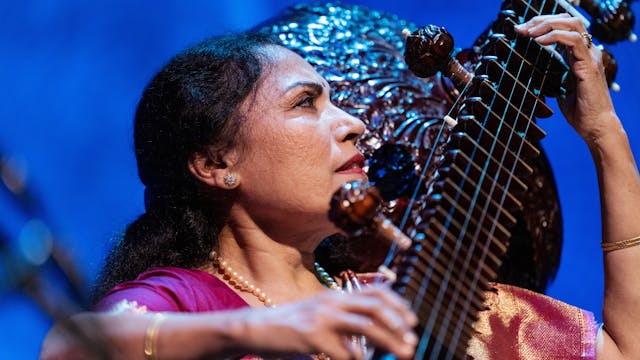Nishat Khan | Raag Darbari Kanada
Evening Ragas
•
1h 46m
Recorded at Darbar Festival 2017, on 12th November, at Sadler's Wells Theatre, London.
Musicians:
- Ustad Nishat Khan (sitar)
- Shahbaz Hussain (tabla)
- Emmanuel Masongsong (tanpura)
Raag Darbari Kanada; Thaat: Asavari; Samay: Midnight
Darbari Kanada is regarded as the king of all ragas. It exudes solemnity and its execution is critical because of the way certain notes are pronounced in its ascent and descent. The suffix of the name, ‘Darbar’ suggests a royal court and is said to be suggestive of the raga’s popularity with kings since the 16th century when it was created by Miyan Tansen, one of the key figures of north Indian classical music and also the court musician of the Mughal emperor Akbar (1542-1605).
Ustad Nishat Khan presents two ragas – Darbari Kanada and Bhairavi in this concert. He represents an unbroken lineage of 7 generations of sitar and surbahar players. His father is the legendary Ustad Imrat Khan, a surbahar maestro and his uncle is none other than Ustad Vilayat Khan.
Ustad Khan begins Darbari Kanada with an alap. He traces the foundational elements of the raga - komal Ga and komal Dha - with meends, subtly suspending the notes in mid-air in a sustained sway of oscillations. He lustily portrays the withdrawn yet potent personality of the raga with consummate command over technique and emotions. The grace notes of komal Dha during descent and of komal Ga during both ascent and descent are captured with an enduring elegance. A vibrant jod and jhalla follow the alap, creating premonitions of the exciting rhythmic journey that is to follow.
In his sonorous voice, Ustad Khan demonstrates the composition, ‘Tumsa Karim Hakim Rahim’, (You are the compassionate one, the healer, the Almighty) before he begins the same on his sitar on a rhythmic cycle of 16 beats or Teental in madhyalay.
Shahbaz Khan plays a restrained accompaniment with Ustad Khan’s elaborations. He brings in flashes of deeply complex and energetic patterns during intervals accorded to him between the melodic development of the raga.
The faster composition, also in Teental, is decorated with intense laykari where the notes are bound in clusters of five, six and seven over the 16-beat cycle. Darbari Kanada is concluded with a dazzling jhalla in an upward tempo where Ustad Khan’s display of tantrakari (instrumental nuances) is well-complemented by Shahbaz Khan’s tabla.
Ustad Khan winds up his performance with a Dadra in Raag Bhairavi, “Saiyyan More Jaan Gaye Preetam,” of which, he also gives a vocal demonstration. The composition is set to a swaying lit of six beats – also known as Dadra, a folksy rhythm that is mostly used in sensuous, romantic songs derived from folk music of central and western India. Shahbaz Khan’s intonation of the romance and drama in this composition is heart-melting.
Up Next in Evening Ragas
-
Kaushiki Chakraborty | Bhajan
Recorded at Darbar Festival 2021, on 24th October, at the Barbican Centre, London.
Musicians:
- Kaushiki Chakraborty (Vocalist and Composer)
- Milind Kulkarni (Harmonium)
- Shahbaz Hussain (Tabla)
- Gunwant Kaur (Tanpura)
- Mithila Sharma (Tanpura)The supremely accomplished Kaushiki Chakrabort...
-
Jyoti Hegde | Raag Chandrakauns
Recorded at Darbar Festival 2023, on 27th October, at Milton Court, Barbican, London.
Musicians:
- Jyoti Hegde (Rudra Veena)
- Surdarshan Chana (Jori)Raag Chandrakauns
Dhrupad is the foremost improvisational classical system from India, rooted in its micro tonal slow to fast development. The ...
-
Kaushiki Chakraborty | Abhogi
Raag Abhogi Thaat Kafi, Samay Night
Musicians:
- Kaushiki Chakraborty (Vocalist and Composer)
- Milind Kulkarni (Harmonium)
- Shahbaz Hussain (Tabla)
- Gunwant Kaur (Tanpura)
- Mithila Sharma (Tanpura)The supremely accomplished Kaushiki Chakraborty, from the Patiala gharana (school of music) ...



